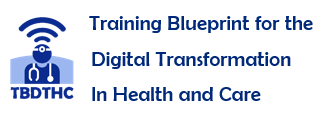
Training Blueprint for the Digital Transformation of Health and Care
// Aim: support of health professionals in acquiring and developing high quality skills in the increasingly digital oriented working context.
// Running period: Oct 2018 - July 2021
// Academic staff: Prof. (FH) Dr. Claudia Stura, Prof. (FH) Dr. Torsten Wojciechowski
// Cooperation partners: Fondazzione Bruno Kessler / Italy, Leadpartner; Provincia Autonoma di Trento / Italy; Co.ge.s Don Lorenzo Milani Societacooperativa Sociale / Italy; Universität Dresden / Germany; University of Nottingham / Great Britain; Stichting Smart Homes / The Netherlands; Fachhochschule Kufstein Tirol / Austria
Digital Innovation in the Fields of Health and Care
The European Commission estimates that 44% of the population in Europe has insufficient digital skills and 73 million people do not possess any. At the same time, 37% of the workforce has insufficient skills and 26 million do not own any.
In particular, studies from the last five years have shown that health workforce investments have been insufficient. The situation is worsened by the reticence of the staff (73%) to the use of new health-care methods that involve the introduction of health technologies.
Despite the range of areas in which new digital technologies could make a substantial contribution to enhance health care access, quality, and service while reducing costs, the health system has been slow to invest in and embrace such technologies. The major reasons for it are
- the speed at which technology introduces new solutions,
- the extremely wide range of technology offer,
- the lack of easy to use testing mechanisms where technologies can be observed and understood, and,
- therefore, there is a gap between the daily practice and professional skills and digital technology trends.
In other terms, there is no consolidated facilitating process (made of available skills, methods and training methodologies) within health care sector designed to narrow the digital revolution and health professionals. At the same time the EU is observing that digital technologies require different skill sets. In addition to digital skills and technology oriented competences, there is an increasing demand for other complementary skills, such as leadership, decision making related and engineering skills. Future jobs, also in the healthcare sector, will require an appropriate mix of basic, soft and technical skills, notably the digital and business-specific skills that education and training systems do not yet fully address.
The Project’s objective
TBDTHC Project addresses this scenario with the aim of supporting health professionals in acquiring and developing high quality skills and competences in order to strengthen their position in the increasingly digital oriented working context and to foster professional development. |
Digital technologies in health will lead inexorably to more developments, whatever they will be. The danger is that it will make us eager to upgrade, before we have even realized their promised benefits. This is because we still do not have enough solutions to understand how they work, which effects they have on what health professionals do, how they will change interactions with colleagues, patients, etc. What is needed is not just a technical (or technological) knowledge transfer, but a rather deeper understanding of how some key competences need to be upgraded in order to help health professionals to fully benefit from the digital era.
In order to reduce the current existing gap between digital technology trends and their effective use in the health sector, TBDTHC pursues four Specific Objectives (SO) that will guide the activities of the project towards an effective implementation and towards the achievement of the corresponding intellectual outputs:
- Increase the level of understanding of digital technology trends and their implications in the health practice (IO1)
- Identify core skills needed to facilitate the adoption of digital solutions in the health sector (IO2)
- Introduce a flexible lifelong training Lab targeted to health professionals (IO3)
- Strengthen health sector stakeholders’ capacity in investing in digital solutions and appropriate training methodology (IO4)
Target Groups of the project
To reach the objectives listed above, the Project addresses three categories of professionals, addressing specific needs identified in their activity:
- Health professionals (managers, doctors, nurses, pharmacists, etc.)
- Non-clinical and administrative staff
- IT professionals working in and for the healthcare environment (including external technology solution providers)
Additional Information under: trainblue.eu
The European Union within the framework of Erasmus+ funds the project.
Disclaimer: This communication reflects the views only of the author, and the Commission cannot be held responsible for any use which may be made of the information contained therein.

